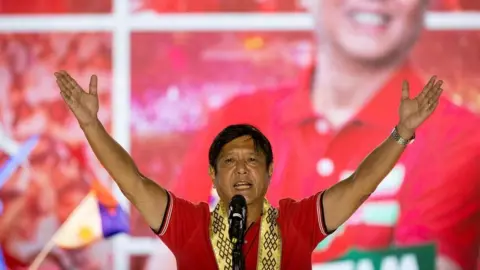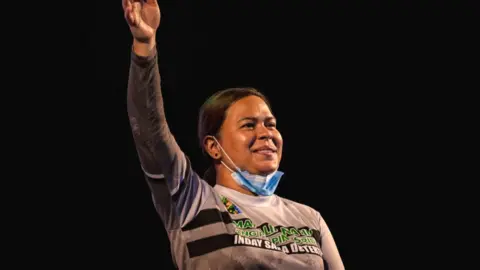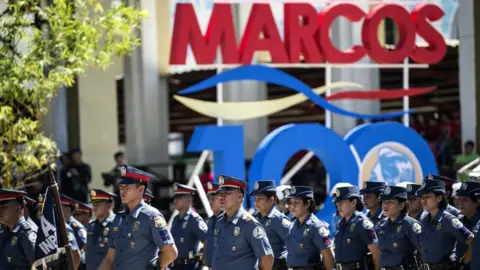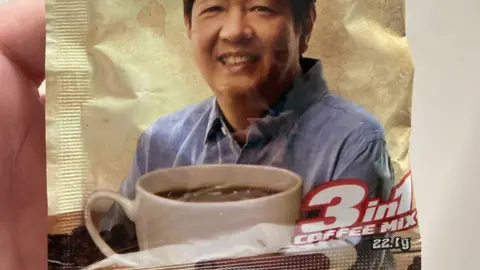Bongbong Marcos: The man attempting to revive a corrupt political dynasty
 Reuters
ReutersHis father was a ruthless dictator. His mother gained international notoriety for her massive collection of shoes.
So how is 64-year-old Ferdinand Marcos Jr, more commonly known by his nickname Bongbong, the frontrunner to be the next president of the Philippines when the country votes on 9 May?
The answer lies in an intriguing web made up of dynastic politics, loyalties going back generations and social media manipulation.
A golden crown and a white stallion
In the Marcos stronghold of llocos Norte sits an impressive colonial Spanish-era style building - the Malacañang of the North.
The original Malacañang palace - the official home to the Philippines' president, sits hundreds of miles away in the capital Manila - but this particular building was gifted to the family by the Philippine Tourism Authority when Ferdinand Marcos ruled the country in the 1960s.
Now open to the public, it is a shrine to his family. Supporters take selfies next to regal portraits of Ferdinand and his wife Imelda Marcos and explore the rooms they once lived in.
Inside Bongbong's childhood room, hanging next to an ornate four-poster bed, is an extraordinary portrait of the would-be-leader.
Bongbong, wearing a golden crown, rides on a white stallion through the clouds. In one hand he carries the Philippine flag, in the other a Bible. A reference to the Book of Revelation in the corner of the painting helps decode the imagery, describing an angel flying over the holy, walled city of Jerusalem.

Deposed in a people's power revolution in 1986, the Marcos family became globally synonymous with corruption.
Independent reporting and court documents offer irrefutable proof of the massive excesses and human rights abuses during their rule.
When revolutionaries stormed the Presidential palace, they found fantastical oil portraits of the family, a jacuzzi with gold-plated fixtures, 15 mink coats, 508 couture gowns, and most memorably - more than 3,000 pairs of Mrs Marcos' designer shoes.
But now, Bongbong is the frontrunner to be the country's next president - and as his campaign gathers steam, his supporters have been casting doubt on these facts.
His opponents say this is because social media has been used to sow disinformation and whitewash history, an allegation the Marcos family deny.
But for years, Facebook has been awash with propaganda posts and anonymous accounts defending the Marcos family legacy.
This manipulation of the past has been so widespread that people parrot misinformation with absolute conviction.
The common theme is that Marcos's tyrannical rule was actually a "golden period" for the country - despite the inconvenient truth that the economy was on the brink, heavily in debt to foreign banks.
Loyalty and legacy
Jesus Bautista, 71, from the capital Manila is a staunch Bongbong supporter.
Mr Bautista used to scavenge at a mountain of rubbish called "Smokey Mountain" - after the time combustible materials in the waste would catch fire, and billow smoke.
In 1983 he was offered a full-time job and pension with the city's traffic enforcers.

At the time Mrs Marcos was the undemocratically appointed Governor of Metro Manila.
As he leans back on a broken bamboo chair, Mr Bautista says he owes Imelda utang na loob [a debt of gratitude], for giving him the publicly-funded job.
He says that despite Mrs Marcos's subsequent convictions connected to an estimated total of $10 billion dollars of plundered money, he will vote for her son.
"I never saw corruption", says Mr Bautista says with a broad smile. "It was just hearsay. I think their enemies tarnished their names. Right?"
US journalist Jim Laurie is one of a few reporters who witnessed the storming of the Marcos palace.
 Getty Images
Getty Images"You went into Imelda's wardrobe room and she had hundreds of designer gowns and dresses with the labels still on from Bergdorf Goodman in New York and other shops in Paris and Rome. She'd never even worn them… and it was a sense in a very, very poor country… and then to see this by contrast it just somehow seemed obscene," he says.
These were just the tip of the iceberg.
Documents inside showed how the Marcos family had moved millions of dollars of illegally appropriated money into Swiss bank accounts and numerous properties in upscale Manhattan in New York City.
Multiple court cases followed. Some led to successful prosecutions against the family, while others failed. Most notable of these failures was a 1990 fraud case in New York City where Mrs Marcos' star power won over the jury and paved the way for the family to return to the Philippines.
In the documentary The Kingmaker, Bongbong describes his dilemma returning home: "I can't come home in coach", he tells the interviewee. "I've always flown first class."
'Destined' for leadership
Bongbong was groomed for leadership from a young age.
Archival footage from 1986 shows him, aged 28, standing diligently next to his father in army fatigues the day the family were forced to flee the official presidential house during the 1986 revolution.
But one of his father's diary entries from 1972 revealed concerns about his son:
"Bongbong is our principal worry. He is too carefree and lazy."
In 1975, Bongbong studied at Oxford University for a degree in Philosophy, Politics and Economics (PPE), a course seen as a gateway to a career as a politician. But he failed to graduate - something he denies.
A report by the Philippine news website Verafiles revealed that Philippine diplomats lobbied for Bongbong to be awarded a special diploma in social sciences after twice failing exams.
This controversy did not stop him from embarking on a glittering political career during his father's regime - until, that is, it was cut short by the revolution.
Upon his return however, he has only gone from strength to strength.
Bongbong's running mate in the upcoming poll is 43-year-old Sara Duterte, daughter of current incumbent President Rodrigo Duterte.
The country's constitution prevents the controversial but popular Mr Duterte from running for a second, six-year-term in office.
In 2016 he unleashed a "war on drugs" which saw thousands of dealers and users executed without any judicial process.
 Getty Images
Getty ImagesHis daughter has vowed to work with Bongbong to unify the country to make it "rise again".
She wants to make military service mandatory for 18 year olds, and Bongbong says he's open to imposing the death penalty on criminals who cannot be rehabilitated.
A cable from the US embassy in Manila in 2009, leaked by Wikileaks, describes Ms Duterte as: "A tough-minded individual who, like her father, is difficult to engage."
Perhaps her defining moment was in 2011, when as mayor she repeatedly punched a court sheriff in the face for disobeying her orders not to demolish a slum.
The social media impact
To fully understand how Bongbong Marcos was able to stage such a strong political comeback, look no further than the province of Ilocos Norte - the traditional family stronghold.
Many there remain loyal to the family because the area received preferential funding even while the rest of the country was subject to 14 years of brutal martial law from 1972.
"Imagine a fierce typhoon ravaging the country, but Ilocos Norte was left completed untouched," one journalist explains.
People here refuse to believe the family is guilty of corruption and rights abuses, a sentiment aided by clever social media manipulation.
"On social media, they divert the topic, it doesn't matter if that person is corrupt, they will say he has a lot of achievements like the infrastructure that we see. It's pointless to argue with them," says trainee lawyer Zsa Zsa Raval who describes herself as part of a "tiny tiny minority" who will not vote for Marcos.
"Oh my god. I get a lot of bashers, bullies, I even get harassed," says Ms Raval. "They ask me, why? You're an Ilocano, why do you vote for someone else? But my answer is simple. It's because I'm a Filipino."
 Getty Images
Getty ImagesBrittany Kaiser, a former employee of the disgraced UK political consulting firm Cambridge Analytica, told news site Rappler that Bongbong approached the company to "rebrand" the family's image on social media - something his campaign has since denied.
And it's not just manipulating the narrative.
Anonymous accounts create a convenient lack of accountability and repeatedly target journalists and truth-tellers.
For instance, when Mr Laurie posted videos of his impartial, first-hand reporting of the Martial Law period on YouTube, their veracity was challenged by scores of faceless accounts.
"They would say things like: "I don't believe this, this must be doctored video from 1986, it couldn't be true", said Mr Laurie.
"There is this sense, and this is the international problem we have, of a very divided body of opinion that is propelled by… various voices on social media, and it does create a tremendous distortion of history and events."
The BBC approached Facebook's parent company Meta for an interview, but only received a statement saying that "since 2017, security teams have identified and removed over 150 covert influence operations for violating policy against Coordinated Inauthentic Behaviour, including several networks in the Philippines."
The company added that it was "working closely with civil society, electoral authorities and the industry to fight election interference, reduce misinformation and provide transparency around political advertising."
And in January, Twitter suspended hundreds of accounts reportedly linked to supporters of Bongbong for violating its rules on manipulation and spam.
But there's a sense that social media companies aren't doing enough. The problem is particularly acute in the Philippines because of the country's higher than average consumption of social media.
A 2020 study by the German database company Stastista, found that Filipinos aged 16 to 64, spend on average nearly four hours a day connected to social networks. By comparison, the United Kingdom averaged nearly two hours a day.
Bongbong's campaign manager, Vic Rodriguez, has vowed to: "continue with our way of communicating direct to the people".
Independent news organisations are deemed "biased" against the Marcos family, and are not granted interviews - the BBC did not not receive a reply to a request.
Apart from social media, the other way of "directly communicating" to the people are through Bongbong's lavish rallies - though he surrounds himself with red-shirted supporters, making it hard for reporters to quiz him.
Attendees are given freebies like wrist bands, t-shirts and 3-in-1 coffee sachets with Marcos's grinning face on it, and the words: "Your ally when rising."

The crowd is fired up with a mix of pop, comedy and dancing - before launching into a parade of pro-Marcos politicians, who deliver short and witty monologues. Policy proposals are rarely discussed in detail.
The BBC attended a "BBM-Sara" rally in April where Bongbong arrived backstage in a cavalcade of gleaming Toyota SUVs. While shaking hands with well-wishers, we approached him and asked if he could really be a good president if he wasn't entertaining serious interviews.
He laughed, but did not reply.
Supporters of Bongbong took to social media to blast my questioning as rude and imperial. They believe the Marcos family have been wronged by the independent media reporting of their legacy. Others accept the corruption, but in the spirit of Christian forgiveness, believe his family deserves a second chance.
His critics say his election campaign shows he is dishonest with the truth, immune to criticism, and surrounded by cronies and "yes" men.
They fear if he's elected in May, he might pick up exactly where his father left off in 1986.
